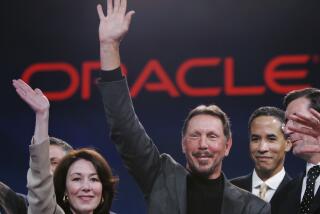Walker Says He Was Unaware of Disney Strategy
- Share via
E. Cardon Walker, former chief executive and director of Walt Disney Co., testified Wednesday that he was unaware of some major considerations when he voted on key issues during the company’s 1984 defense against Wall Street raider Saul Steinberg.
Walker was the second defendant called to the witness stand by the plaintiffs’ lawyers during the jury trial in Los Angeles Superior Court. At issue is the $325-million buyout of Steinberg’s 11% stock holding in Disney at an above-market price on June 11, 1984.
Past and present shareholders are suing the 11 people who sat on the Disney board in June, 1984, as well as the Disney company, Steinberg and the investment firms Drexel Burnham Lambert Inc. and Morgan Stanley & Co.
Walker, a 45-year Disney employee who remained on the board after retiring from active management in 1983, testified that he had no recollection of various strategies to fight Steinberg--including putting large blocks of company stock in “friendly” hands by making major acquisitions.
Unaware of Arvida Plan
The board voted in June, 1984, to swap $500 million of Disney stock for Arvida Corp. and Gibson Greetings.
Under questioning by attorney J. Michael Hennigan, Walker said he was vacationing in Hawaii and participated by telephone in the board meeting at which those matters were approved.
Walker said he had not heard that the company was putting 20% of its stock in the hands of Arvida’s controlling shareholders, the billionaire Bass family of Texas. Neither, he said, had he known that the Basses parlayed a $20-million investment in Arvida into $200 million of Disney stock.
He said he had been unaware that the subsequently aborted Gibson deal would have made its owners, William E. Simon and Ray Chambers, the largest shareholders in Disney.
Walker further said he did not recall knowing that the Basses had entered into an agreement to refrain from increasing its Disney holdings.
Shortly after Steinberg’s departure from the Disney scene, several new directors representing the Basses worked with Roy E. Disney to replace Ronald W. Miller, Walker’s successor as chief executive, with Michael D. Eisner. The reconstituted board also killed the Gibson deal.
Walker also testified Wednesday that there was no discussion at the June 11, 1984, meeting to approve the Steinberg buyout that the company already was protected by a so-called “supermajority” provision of its bylaws. That rule stated that a takeover not favored by the board must be approved by holders of 80% of the company’s stock.
He said he did not know, either, that a leveraged buyout by two branches of the Disney family had been proposed a day earlier by one of the heirs, Roy E. Disney.
More to Read
The biggest entertainment stories
Get our big stories about Hollywood, film, television, music, arts, culture and more right in your inbox as soon as they publish.
You may occasionally receive promotional content from the Los Angeles Times.










